Western Localization Of ‘Fire Emblem Engage’ Removes Gendered Language, Censors Romantic Confessions
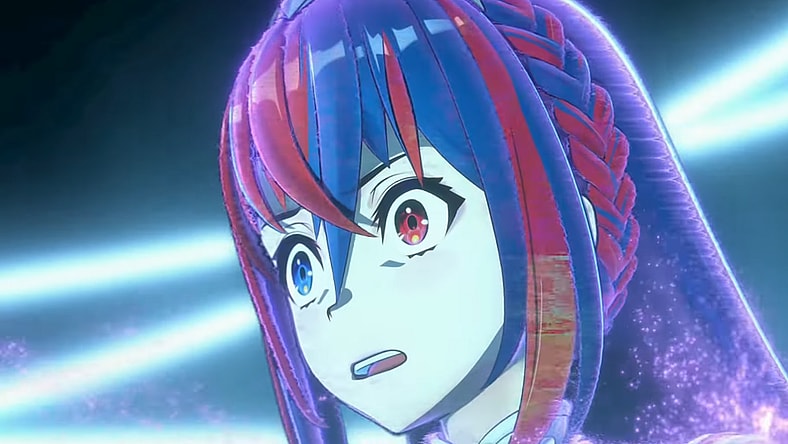
Fire Emblem Engage’s English localization has attempted to remove gendered language, and censored problematic romance scenes.
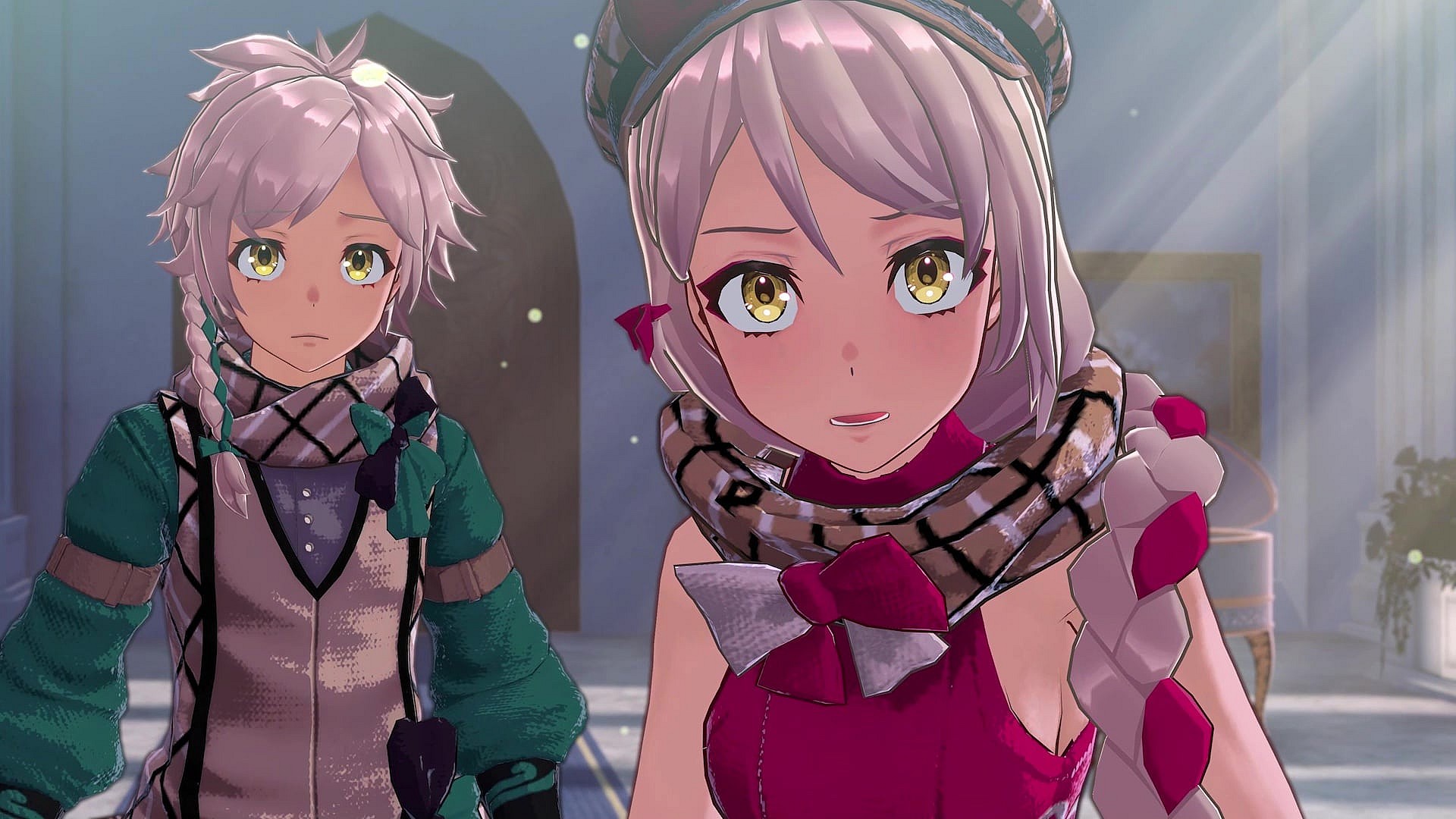
RELATED: Crunchyroll Removes Gendered Language From English Localization Of “ONIMAI: I’m Now Your Sister!”
Editor’s Note: The following article will contain spoilers for Fire Emblem Engage throughout. This includes characters the player can recruit through the story, and who they can make romantic relationships with.
The news comes from not just @iuntue — a Twitter user who specializes in exposing inaccurate and outright censoring localization ‚ but also users @Mondblut1984 and @omegavalwin. Together, the trio have shared scenes of Fire Emblem Fates‘ localization and compared it to the Japanese original; noting key differences in both releases.
It appears that gendered language has been removed — that is, any suggestion of differences between men and women — along with what appears to be the player’s romantic relationships being made platonic. The latter come with a caveat however.

The Support System in the Fire Emblem series allows player units to become friends, granting stat bonuses when they are near each other in battle. While each new rank attained shows a conversation between two characters (C, B, and finally A-Rank), the highest Supports can be a confession of love between two.
Some games have also distinguished between platonic and romantic relationships with A+ and S-Rank Supports. Fire Emblem Engage features three tiers of Support, while the main character can give a Pact Ring to one allied unit.
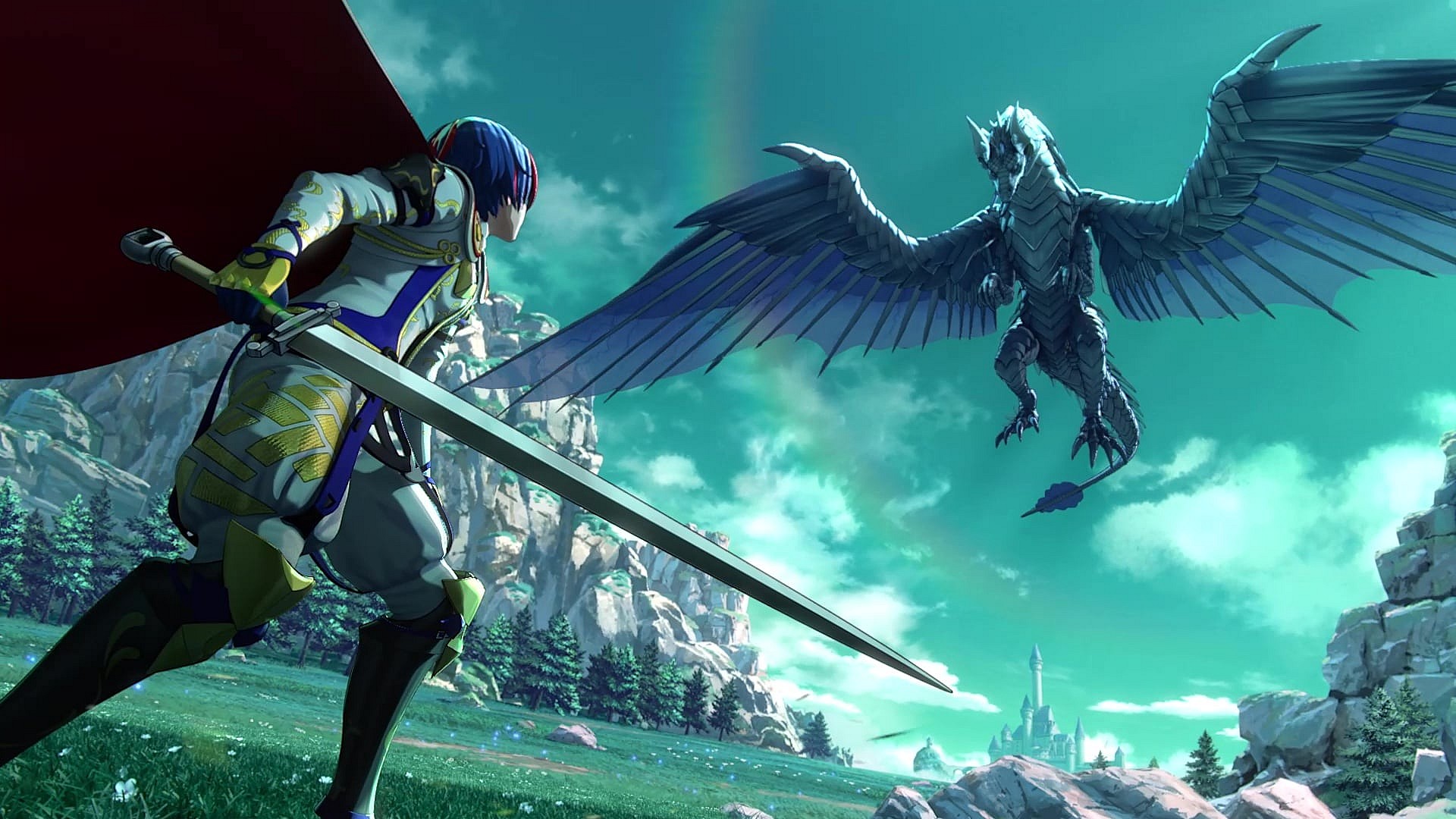
One scene that caught attention is the player’s Pact Ring conversation with aspiring merchant Anna. Over the prior conversations, Anna becomes disheartened she cannot think of a new product to sell on Sweetheart’s Day. She’s also frustrated with being treated as a child despite being 11 years old.
The player character’s idea of hand-crafted necklaces fills her with confidence, and sure enough they sell out by the time the player gives Anna the Pact Ring. To show her gratitude, Anna saves “the best one” as a gift for the player.
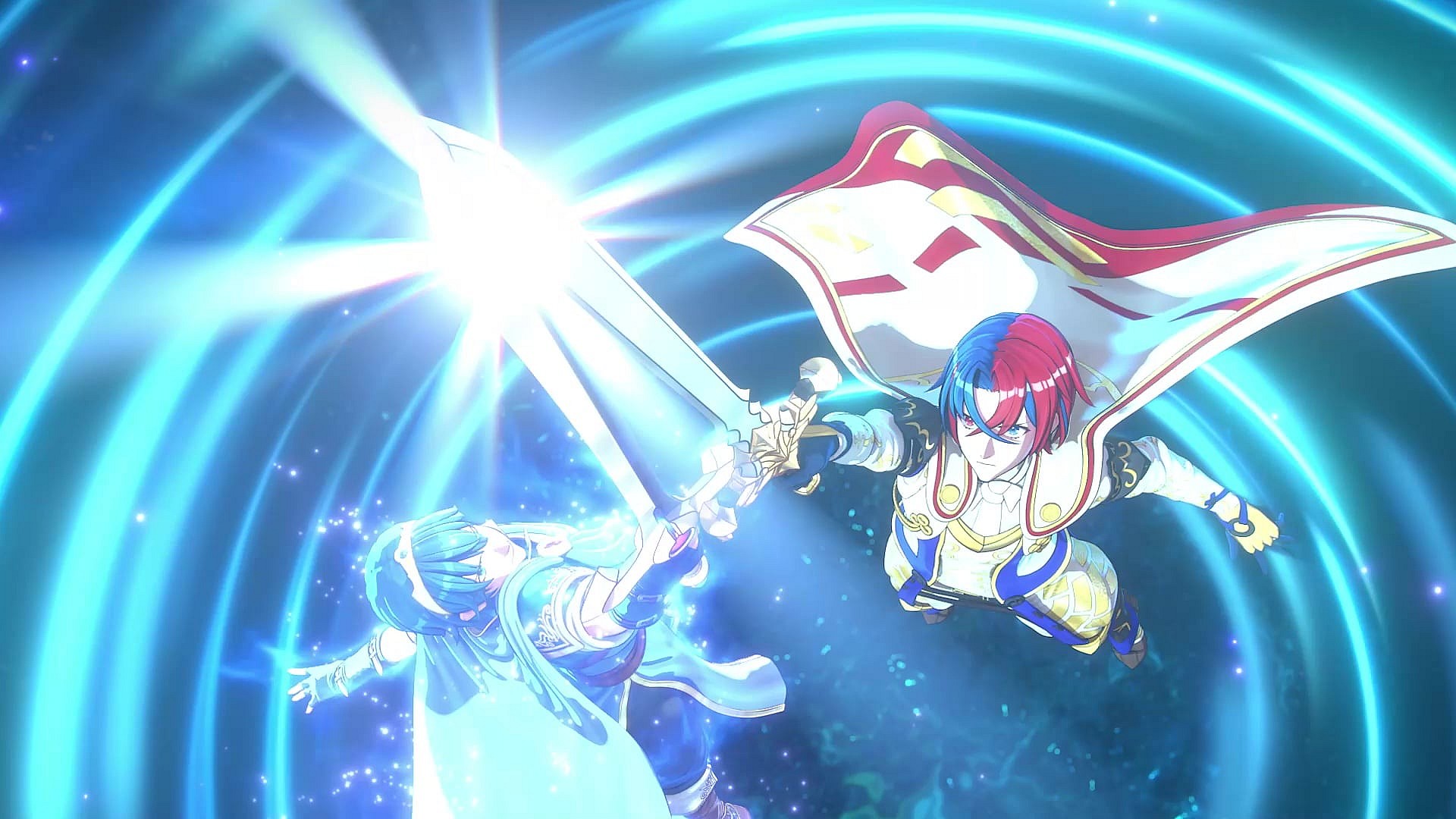
The scene then differs in Japanese and Western versions, understandably so due to Anna’s age. @iuntue shared snippets of the scene — garnering 4.1 million views on Twitter, as of this writing. We further checked the scenes in Japanese and English for greater context, as well as contacted @iuntue for further information.
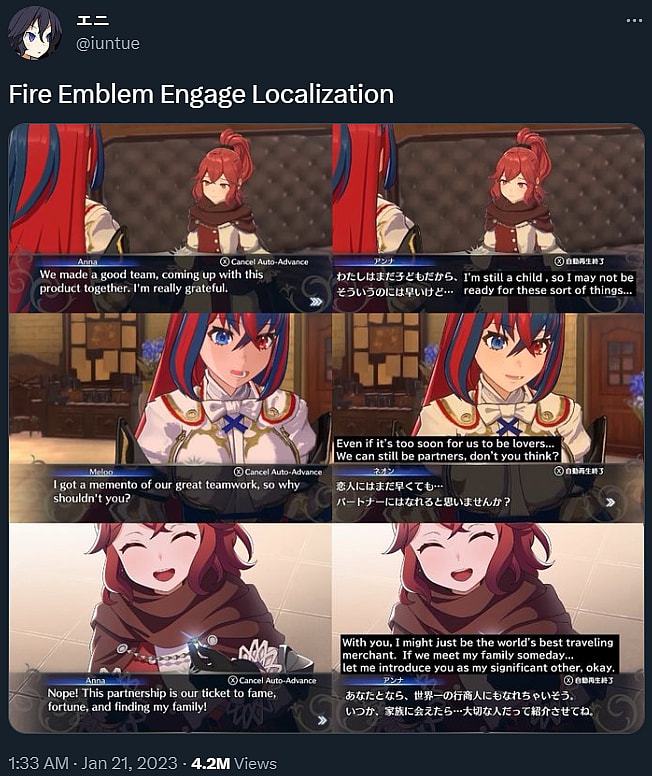
Anna says she saved the best necklace as a symbol of her friendship with the player character in English. In Japanese however, she hints at it being a platonic gift only because she’s still a child and “not ready.” (Machine translation via DeepL, adjusted in cases of inaccurate translation, and including @iuntue’s translation where applicable).
English:
Player: This is the best one? You really don’t mind if I have it?
Anna: I wouldn’t say it if I didn’t mean it! I just… you know… really appreciate how much you help me out.
Player: That’s kind of you to say.
Anna: We made a good team, coming up with this product together. I’m really grateful. So I thought you should have the best one as a sign of our friendship.
Japanese:
Player: She said it was the best she could make… Can I have it?
Anna: You’re already being so obtuse. Think about what that means. But you know… Today is a special day…
Player: ! [Surprised gasp]
Anna: I’m still a child, so I may not be ready for these sort of things… It’s a sign of friendship with the divine dragon!
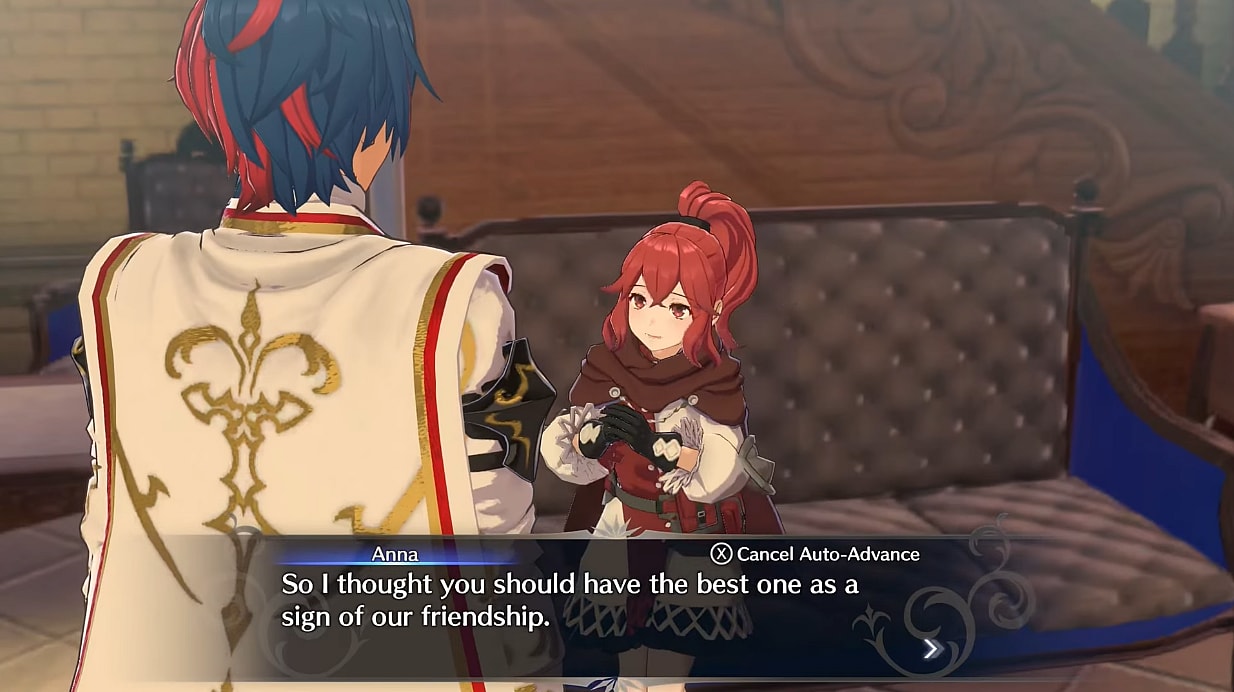
At first, it may seem the small chuckle in Japanese voice acting (or “Aww” in English) may indicates the player character is laughing at Anna believing all gifts on Sweetheart’s Day must be romantic. This may be overreaching on our part, and not how @iuntue interpreted the scene.
Regardless, the player character accepts the gift, and offers the Pact Ring as a gift, much to Anna’s shock (in awe of its value in English, and importance in Japanese).
English:
Player: That’s exactly why I want you to have it. The best goods are one-of-a-kind, right? I got a memento of our great teamwork, so why shouldn’t you?
Anna: True… We did come up with a smash it, so I guess that foes make us partners after all. All right, all right, I’ll take it. What a great day this is turning out to be!
Japanese:
Player: It is very important to me. I hope Anna will receive it. Even if it’s too soon for us to be lovers… We can still be partners, don’t you think?
Anna: I guess so. In fact, we are both partners who have created new products! Thank you. I’ll take the ring. I’m so happy!
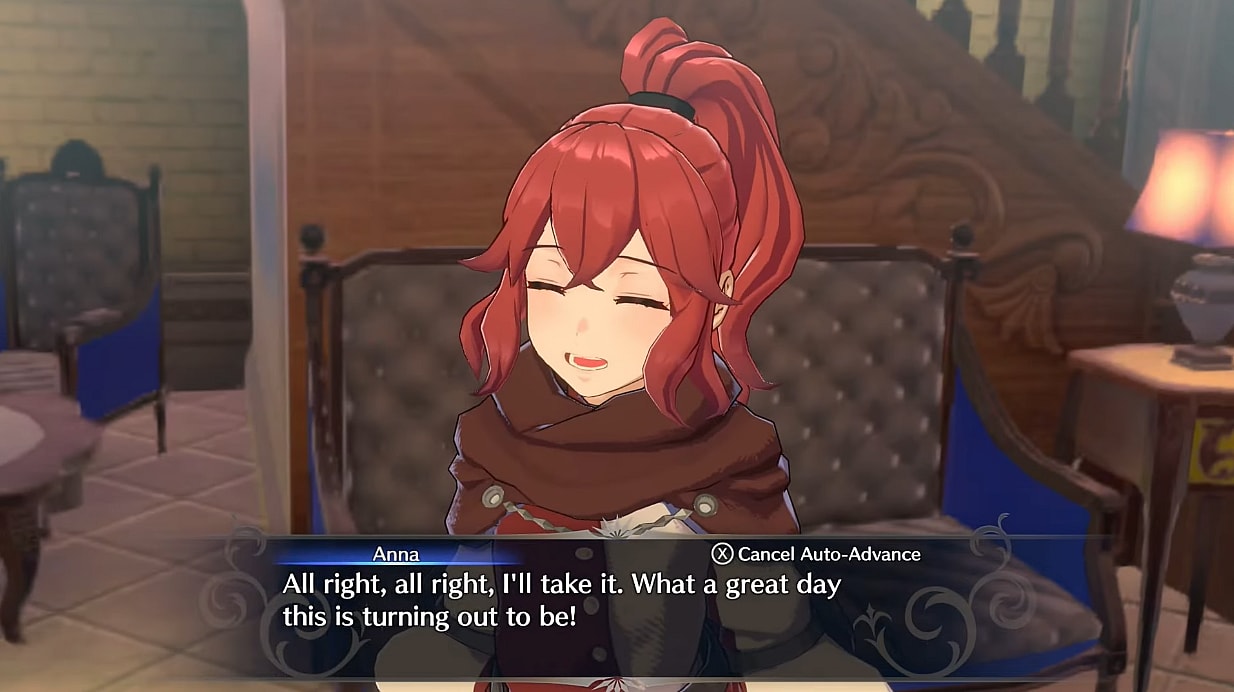
Anna then starts talking about mass-producing the earrings, much to the amusement of the player character. However, in Japanese, the player character makes it clear they’ll support Anna as more than being the partner of a merchant, and Anna expresses interest in introducing the player character as their “significant other” to their parents.
English
Player: Hahaha! How mercenary of you. Never change, Lady Anna. I can’t let my business partner go soft, right?
Anna: Nope! This partnership is our ticket to fame, fortune, and finding my family!
Japanese
Player: Hehe, you are so tough. Anna, I will always support you… You as a merchant. And you as a partner.
Anna: With you, I might just be the world’s best traveling merchant. If we meet my Family someday… Let me introduce you as my significant other, okay.
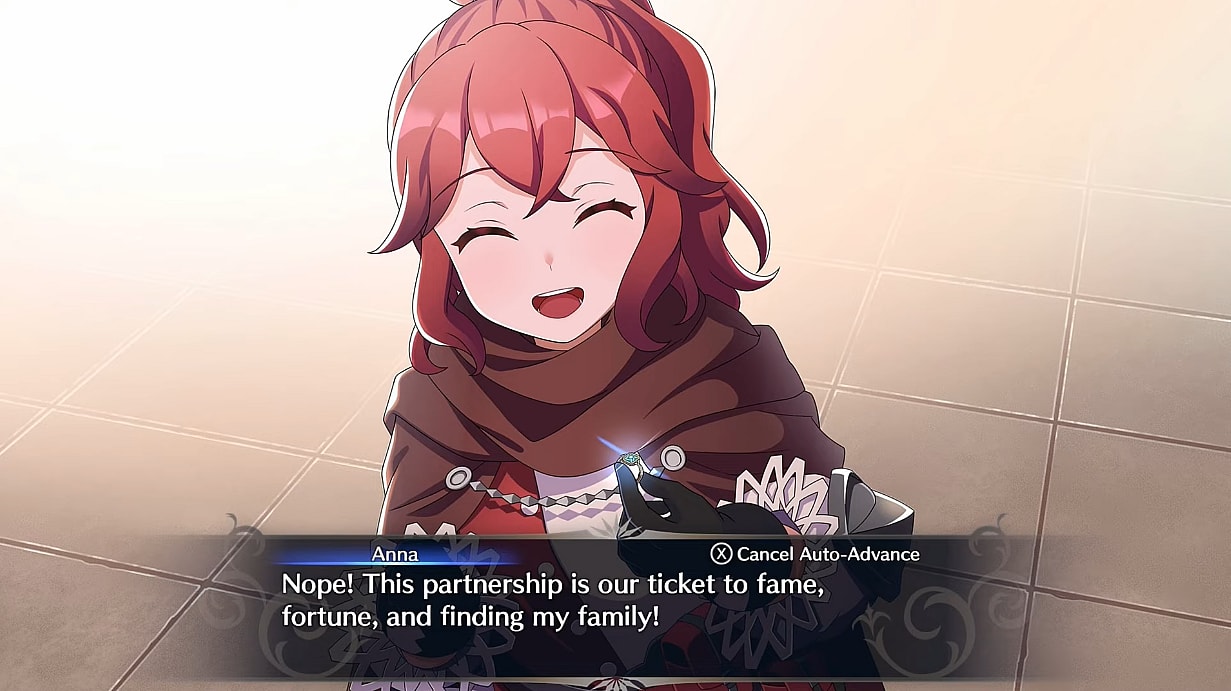
It shouldn’t be surprising that any suggestion of a romantic relationship with such a young character would be censored. In fact, the majority of the censored Pact Ring conversations and more showcased by @omegavalwin and @Mondblut1984 feature characters under the age of 18.
These include Clanne, Framme (both 16 and being noted as “Stewards” to the player character after the events of the game), Céline (17), Etie (17), Hortensia (14, and confesses her feelings twice), Rosado (17, and a friend even after the game), and a character who is later revealed to be not just physically 16 but a sibling to the protagonist.

There is also Jean, 10, though his conversation in Japanese he says, “Thank you very much for letting me stay by your side. I will grow up slowly and become a great partner.” This sounds platonic at best, or grooming at worst. It should be noted “partner” is also used by the aforementioned sibling as well.
Of the characters that are 18 and older, Diamant is a little vague. He talks about always fighting by the player’s side in English, while in Japanese the character says he will “stay by your side from now on. I will protect you even at the cost of my life. With my two precious rings.” Yet, after the events of the game there is no talk of Diamant even being in contact with the player character beyond diplomatic meetings.
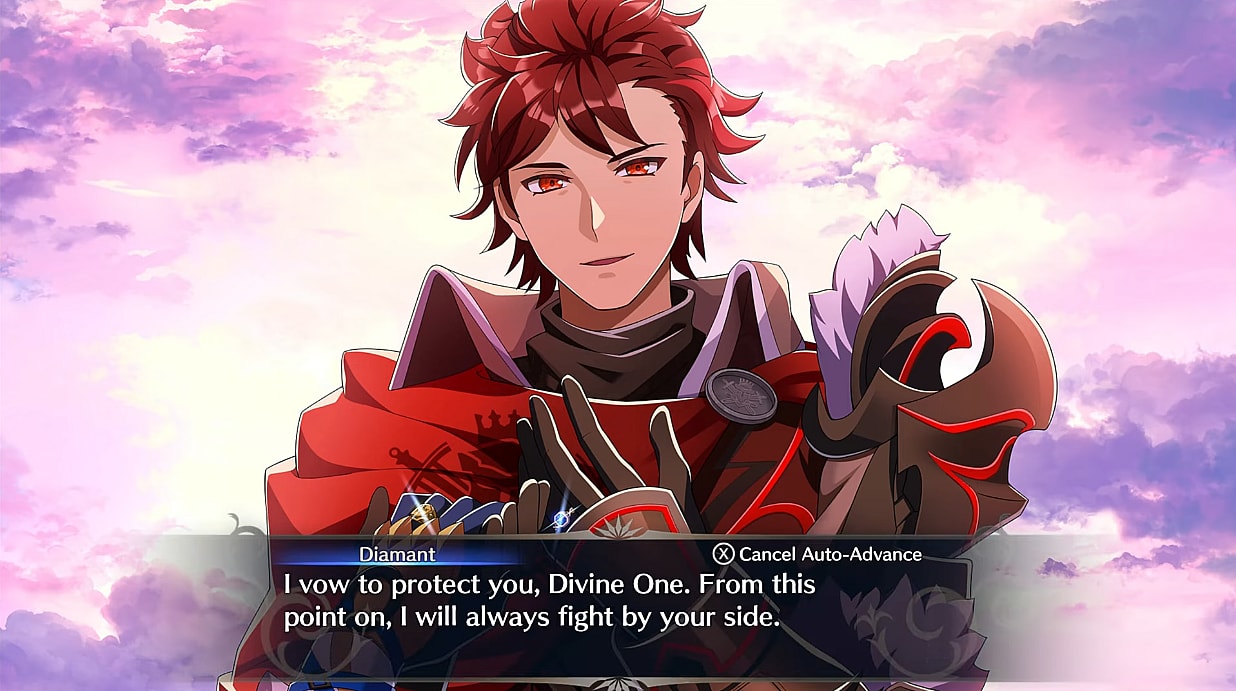
Timerra also talks about the bond between her and the player character — even in the original Japanese dub the dialogue reads, “I’m so happy. I will cherish this bond…even in death. The two of us will always be together, no matter where we are.”
But when the two meet up, they seemed to be only grilling in the English version, rather than any talk of a romance. Despite this, the romantic feelings of Chloé, Goldmary, and Panette seem to be intact.
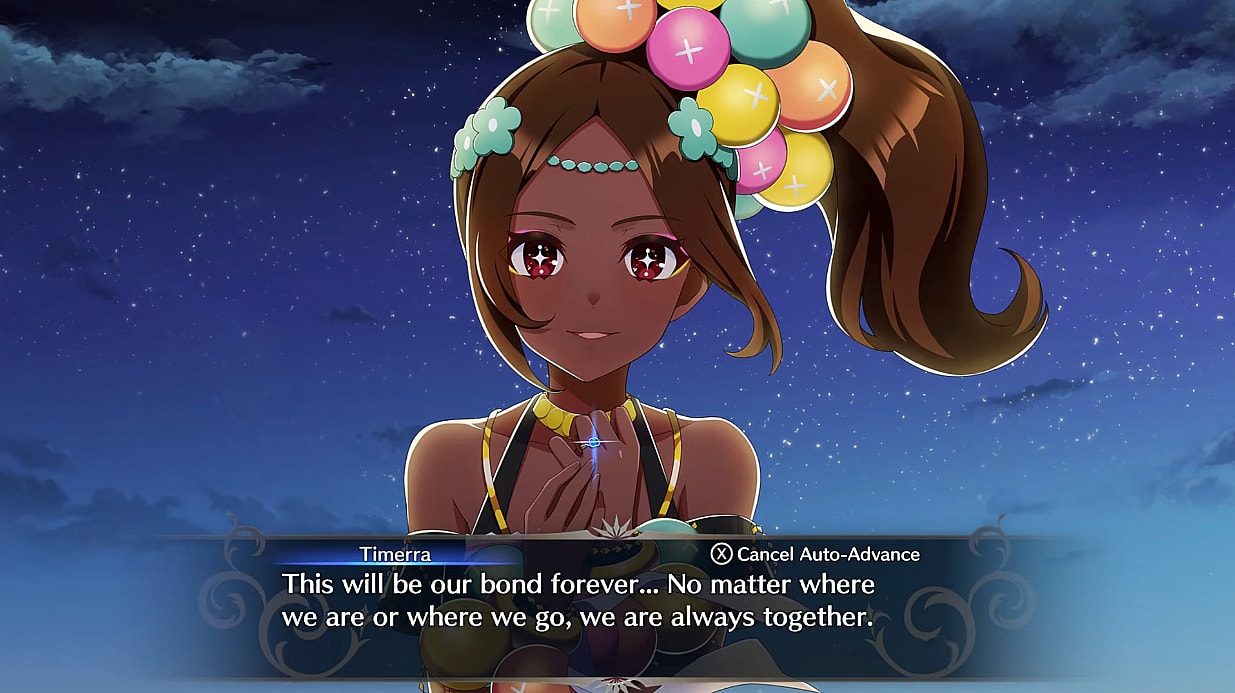
While the changes to the romance conversations could be argued, there are also several instances when mention of gender or differences between the sexes is removed.
Much like Animal Crossing: New Horizons, recent Pokémon titles, and Splatoon 3, Fire Emblem Engage avoids mentioning gender when players choose a male or female player character. Instead, they choose their “form.”
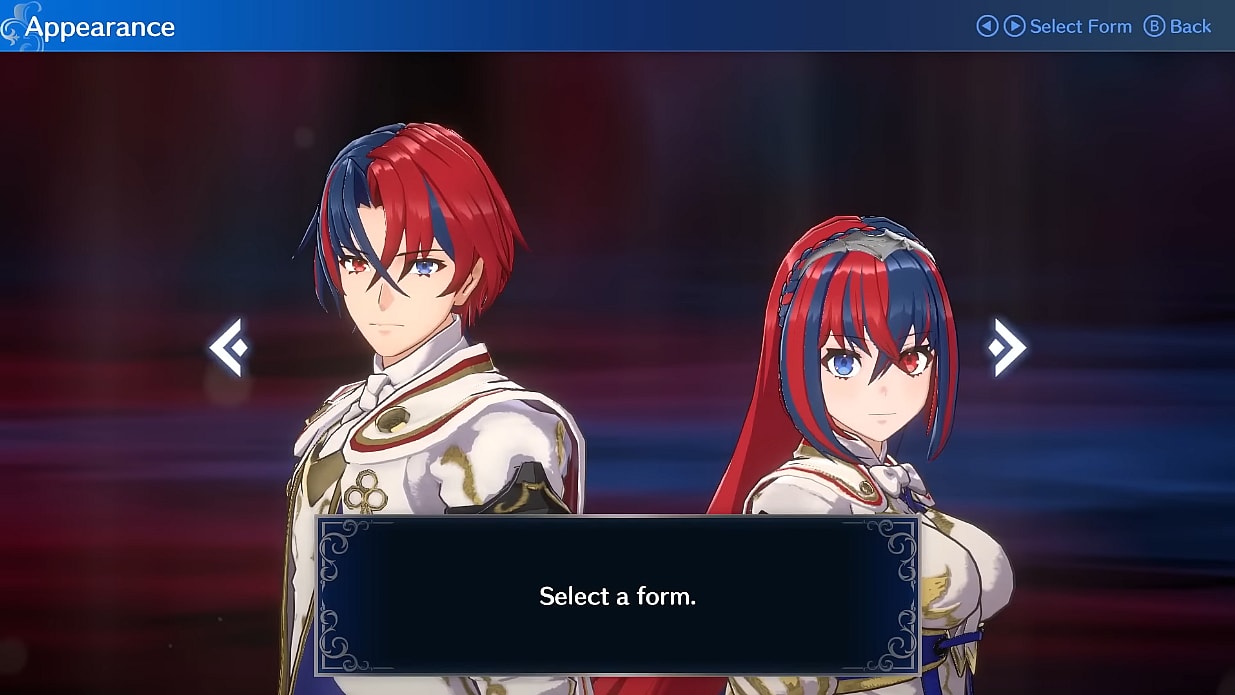
In another scene between the player character and Hortensia, praise for “inner beauty” is changed to just being a nice person.
English
Player: I’m in awe of what a wonderful person you’ve become. So much so, in fact, that I feel I need to start working on my own kindness just to keep up.
Hortensia: Don’t be ridiculous. You’ve been amazing since the day we’ve met.
Japanese
Player: What a lovely smile. It’s as if your inner beautify seeps through it. I’ll also need to polish my inner and outer self, or I won’t be able to keep up.
Hortensia: Oh, you’re already fine on the outside. And you’ve been pretty ever since we’ve met.

In another instance where players unlock the Emblem Celica, Céline praises her beauty in the original Japanese, yet doesn’t in English.
English
Céline: Emblem Celica. How marvelous. Divine One, with your blessing- and hers, of course- I would like to fight by Celica’s side.
Japanese
Céline: Amazing… Emblem Celica… How beautiful. WI will fight as well. Please Shinryū-sama (Lord Divine Dragon). I ask that you lend me her power.

Even text that could be taken as flirting was removed. As Veyle praises the player for bandaging a wound, her mentioning the player’s hands being warm was cut.
English
Veyle: I owed you for patching me up the other day. That was so kind…
Japanese
Veyle: I just wanted to thank you for bandaging me up the other day. Your hands were so warm…
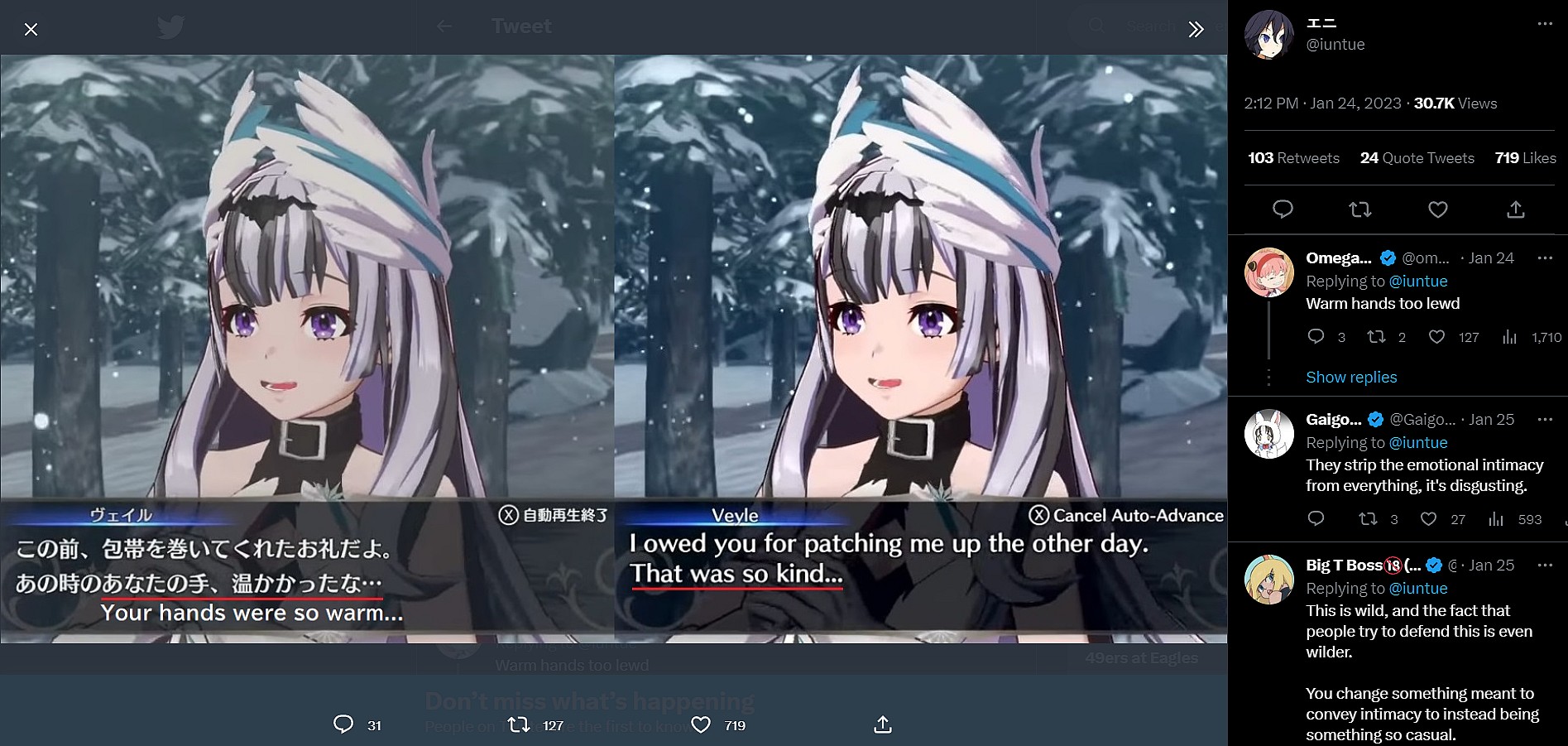
Even comical scenes alluding to what a person may want in a partner was culled. At one point, Fogado expresses an interest to have dinner with the player character and discuss matters. In Japanese, it’s asking what their type is, but in English, merely who their best friend is.
English
Fogado: But thanks for the compliment. How about we grab dinner together sometime?
Player: Dinner?
Fogado: Yeah! You, me, and some hard-hitting questions. Like… who is your very best friend and why?
Player: Um, that’s pretty personal.
Japanese
Fogado: Oh although… If you’re going to complement me like that, why don’t we go have dinner?
Player: Dinner?
Fogado: I want to have a private conversation with the Divine One. Yeah! Asking things like “what kind of person is your type!”
Player: T-That’s a bit…
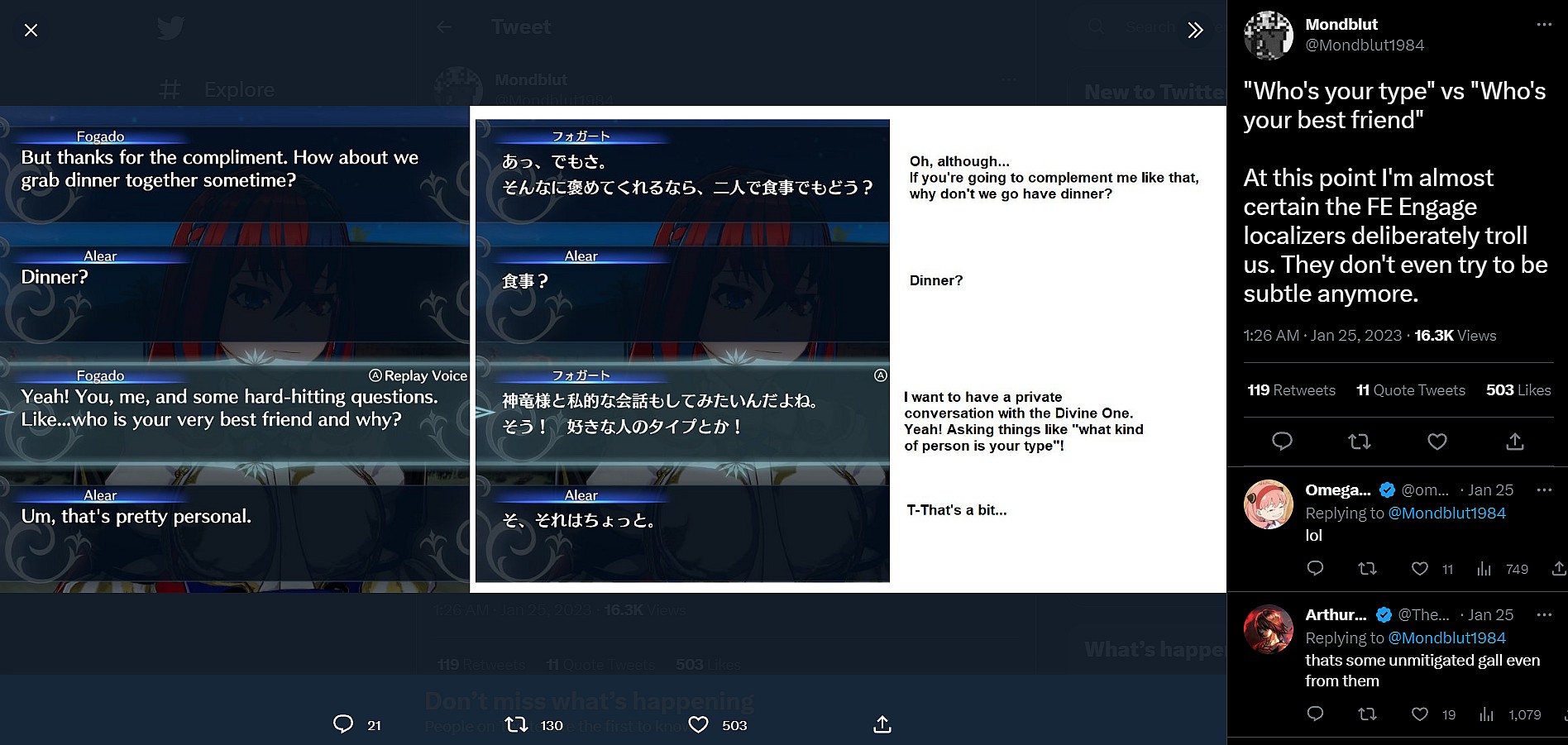
@omegavalwin notes multiple times where characters avoid mentioning the gender of the player character, compared to the Spanish version of the game. This includes avoiding he or she pronouns (even in cases where other languages).
In the case of a male protagonist, the game uses “child” instead of “son” on multiple occasions. This also allegedly carries over to the Japanese version, with machine translation of that scene having Lumera state “Thank God… I’ve missed you so much…!” Yet, coding must exist for the Spanish version to have two different dialogue boxes for this scene.
The platonic relationships for underage characters also continues in the Spanish version.

Even the voice acting hasn’t been spared from scrutiny. While some have praised it for not taking itself too seriously, streamer @ActualAero was “convinced Fire Emblem Engage is just a Nickelodeon sitcom, it fits so well.”
Showing a scene edited to included canned laughter, it’s not hard to see how the over-the-top delivery and lines themselves (even for a comic relief scene) can be easier to laugh at than laugh with. That being said, this may be the very reason some like this game — including @ActualAero, judging by their other tweets.
I'm convinced Fire Emblem Engage is just a Nickelodeon sitcom, it fits so well 😭 https://t.co/1wRsKgG8Pk pic.twitter.com/3rfxQBnriT
— Pokémon (@ActualAero) January 23, 2023
The localization of the Fire Emblem series has come under scrutiny before. After the success of the Operation Rainfall campaigns across 2011 to 2015 — begging for Japanese-exclusive Nintendo titles be localized into English — led to the inspiration of the “Torrential Downpour” movement.
While Fire Emblem: Awakening had censored a scene of swimsuit DLC, fans had more to be critical about with Fire Emblem: Fates‘ localization. Along with typos, it had scenes completely different to the original script.
Infamous scenes included two assassins praising each others skills being changed to total silence as a joke, and cringe-worthy lines such as animal snarling being “dragon for ‘I love you,'” and conversations between Kitsune almost stripping away all spoken text for animal actions and noises.

There was also the removal of a head and face-petting minigame, swimsuit censorship, personality changes, and no Japanese audio.
Nintendo also came under fire after outraged gaming press, compared one scene in the original Japanese to gay conversion therapy. One character, Soleil, is charmed by cute girls to the point of distraction, and can ask male players for help. She is given magic powder that temporarily makes her see men as women and vice-versa, in what is intended to be a comical scene.
Nintendo announced the western version wouldn’t have any scenes that could be taken as that, with the final scene having the player put a blindfold on Soleil and ask her to imagine. Most of Soleil’s male romances were also changed to be strictly platonic, despite the character having options to romance both men and women.
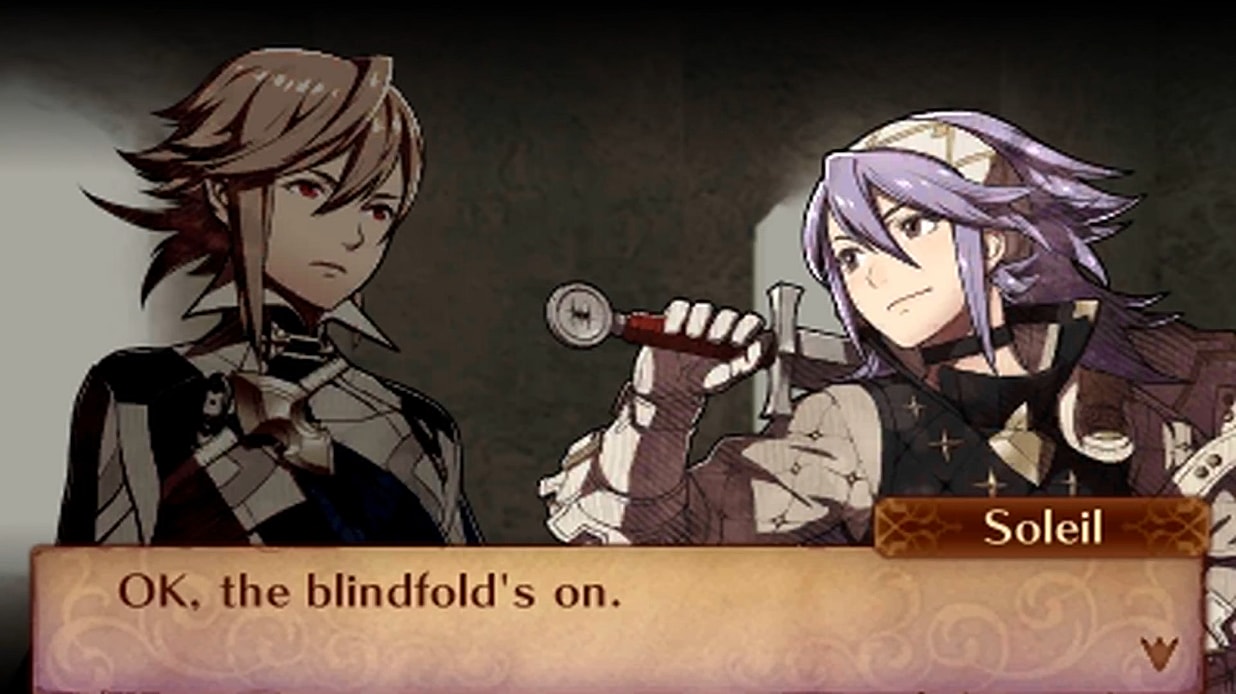
Nintendo Treehouse, the division which handled Fire Emblem‘s localization, became the symbol of the company’s bad localization. This may have led to 8-4 handling localization of Fire Emblem Echoes: Shadows of Valentia, but that didn’t stop censorship of spin-off Tokyo Mirage Sessions #FE, and its Nintendo Switch port (both handled by Atlus).
As such, it may be that Fire Emblem built a reputation for being censored or poorly localized. Fire Emblem: Three Houses did have one scene updated post-launch to be more accurate to the original Japanese, but dialogue that could be deemed racy or sexist was still censored.
